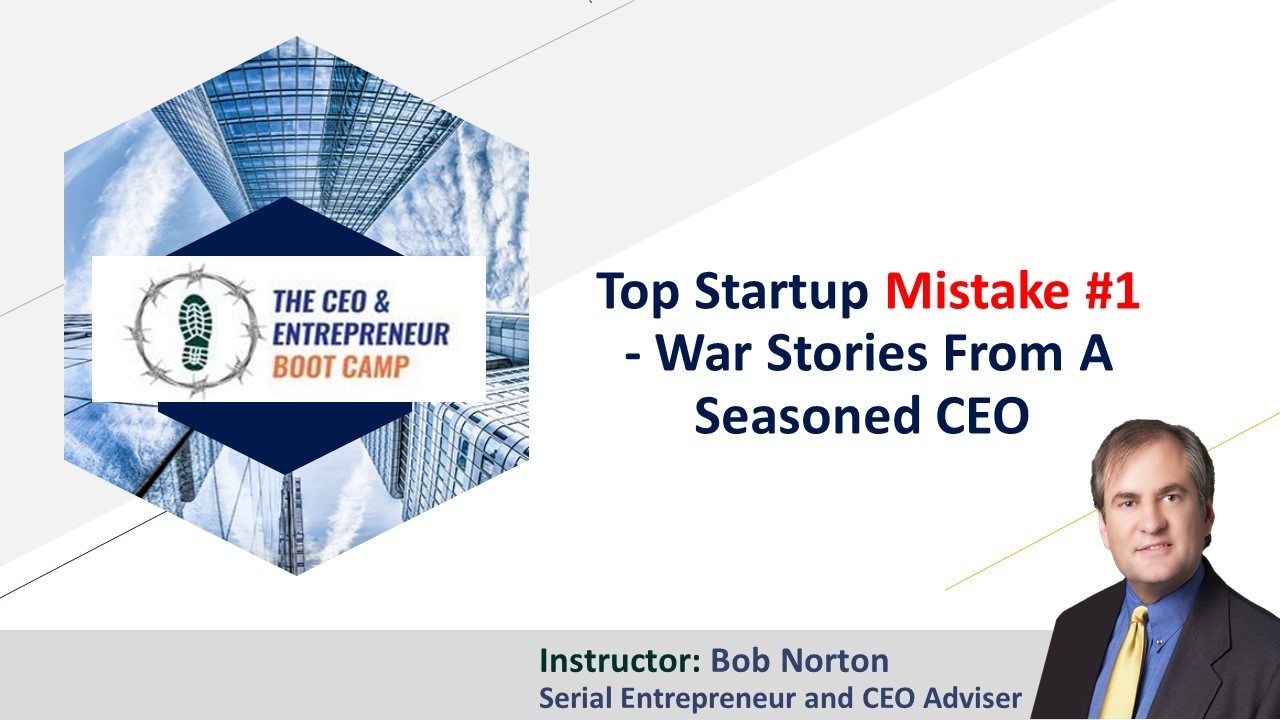Top Startup Mistake #1 - War Stories From A Seasoned CEO

Once I was acting as President at a small startup that was spending money at a rate of over $350K per month when I arrived and did not yet have any sales, marketing, or operations staff. Virtually everything was going towards product development, with no expertise in the house on anything else to divert resources there. The founders were both very bright technical people and built a huge development group, just like the one they had back at their former big company. This proved to be the company's downfall when combined with market factors because all the money was spent assuming more would be easy to get later. However, this was not their fault really. The novice IT investors running the incubator were also from big companies, used to big numbers and larger biotech investments. These fund managers allowed the two technical people to run the company and decided not to bring in a CEO until about 90% of their investment had already been spent. This proved to be penny wise and pound foolish, as the CEO’s salary would have been a small fraction of the wasted money. Even a part-time CEO could have averted this disaster easily during the first 18 months. Of the $5 million spent, at least half was wasted because they did not develop an MVP product but built the perfect “battleship” instead. This was the thinking in the Internet bubble time but I think mostly because very these VCs did not understand the software well. Spend because money is easy to get. Always a bad thing.
Example #1 - The Legal Contract
One of the biggest faux pauxs I discovered was an out-of-control "let someone else do it attitude". This is where managers do nothing except try to "manage" it. However, in their mind managing it is paying someone else to do it, so they don't have to, and so they have no real liability for any failure and effectively make no real value contribution. Not the startup way where everyone should be doing three jobs, not none. They just did nothing, so they can blame it on the third party. Big company politics and style, not startup mode.
One great example was where the company needed a legal contract pulled together for its enterprise software license. The operations manager, who spent most of his career in big companies, did just what he would have done at those big companies. He called a Lawyer to get a contract drawn up from scratch. Unfortunately, with no in-house counsel who was motivated to do it in minimum time, it was sent to the outside law firm with the exact opposite motivation. No law firm can or should be trusted to do things efficiently. In fact, most law firms, and the entire judiciary industry’s, modus operandi is to spread it over as much time and billable hours as possible. Death to a startup, really. Also, somewhat immoral in my view.
By the time we saw the first legal bill for this contract, it had been drafted from scratch, edited, circulated around the firm to four different lawyers, without consulting the client, and the bill was over $15,000. The fact of the matter was that remarkably similar contracts were available for free at numerous enterprise software company websites to copy and then edit in some customizations we needed. I would have done 90% of that myself at no cost. This would have been the "startup" way to do it. Of course, we would have gotten a final legal review too, but the bill would have been ten percent of what was spent in this instance. It was a total waste of money and in my view enough to fire this law firm. But they were too friendly with the venture partners. They had no clue what a startup is and how to have one as a client. This is why I typically hire a sole practitioner, not a firm, until a company reaches at least $1 million annual revenue. Startups manage risk every day, and Attorneys spend a fortune trying to make risk zero when the downside is less than the cost of the legal bill they generate. We had zero customers and this was boilerplate stuff mainly.
Now, this process MIGHT be OK for a large company where the contract cost would be spread over many hundreds, or even thousands of customers, and where the liability was therefore fairly high, but this company's entire business model was in flux, and it expected no more than two customers in the next quarter. This document was guaranteed to change at least every quarter for the next year as the business model evolved, so, in essence, was a wasted effort. Obviously, no one understood the real risk-reward-cost ratios here.
The liability on this contract, essentially for beta testing purposes, was very minimal really. The software would not even run in a production capacity for many months. Everyone knew these facts, but they did not really think about it or adjust their standard way of doing things based on this knowledge. So, this document was made "perfect" at a cost far exceeding any possible benefit.
Of course, I am not advising against getting good legal advice, nothing can pay such great dividends when done right, but I am saying you need to put parameters of maximum costs around every task any vendor takes on and pick your vendors carefully. In this case, a document taken from any enterprise software company website edited down for simplicity (which should invalidate any practical copyright issues) and then reviewed by a medium level attorney should have cost well under $1,500.
To get more tips, visit blog
What was surprising to me was that this law firm claimed to be a "real startup company type firm". Which they were sometimes with the right partner or associate I suppose. When confronted, the senior partner who billed it, defended the bill to the death. She claimed that this was "necessary" and that the five attorneys who participated all "looked at different things". Hogwash!
Well, somewhere in that firm I know there are people who know what a startup is, but the people who worked on this contract clearly didn't have a clue. Or just wanted to book billable hours, which move Lawyer to Partners after all. In my opinion, they should not be allowed to do any further work for the company unless they admit their mistake (after this explanation) and heavily discount that bill, or even forgive it completely as a massive mistake on their part! They just don't "get it".
Of course, in the end, the person who allowed the law firm to go wild must accept some responsibility too. And I would recommend the same outcome. If they see their mistake, think through it, and adjust how they do things in the future then that's great, lesson learned, and move on. If they do not then they better find a job at a big company fast, because they might even bring down a startup if that type of philosophy permeates the organization. I always recommend that no less than 50% of senior managers have a strong startup experience. And can bring out their own trash if necessary.
Join the course How to Raise Millions from Outside Investors
Bob Norton is a long-time Serial Entrepreneur and CEO with four exits that returned over $1 billion to investors. He has trained, coached and advised over 1,000 CEOs since 2002. And is Founder of The CEO Boot Camp™ and Entrepreneurship University™. Mr. Norton works with companies to triple their chances of success in launching new companies and products. And helps established companies scale faster using the six AirTight Management™ systems. And helps companies successfully raise capital.
What can we help you with today? Scaling, training, consulting, coaching?
Call (619) SCALE06 or (619) 722-5306 9am-6pm CT
Or Schedule a free 30-minute strategy session by clicking here.





